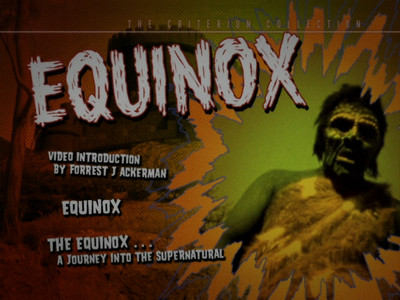
I'm off to Comic Con International in San Diego, CA, where Joëlle Jones and I will be hanging out at the Oni Press booth to celebrate the debut of our new comic book, a little crime novel called You Have Killed Me
In honor of that, I thought I'd review another indie effort, though this one in a different field and a different genre. The low-budget, self-made Equinox is perhaps another of those cult classics with a back story that is more interesting than the film itself. (But then, if you stop and think about the term, we usually associate the term "cult" with blind believers that have been duped, don't we?) In this case, Equinox, or as the original version was called The Equinox…A Journey Into the Supernatural, is a late '60s monster movie put together by a group of guys who loved monster movies. The effort was spearheaded by Dennis Muren, who would later go on to work on Star Wars and change the way special effects were done at Industrial Light and Magic. This 1967 picture, written and codirected by Mark McGee, was more in line with old school effects as pioneered by Ray Harryhausen, far from the more refined tricks Muren would later develop. So, a heaping amount of the love for Equinox comes from the fact that the monster effects were done in stop-motion using clay figurines designed by Muren and largely animated by David Allen. And indeed, these make for the best parts of the movie, my favorite effect being the tentacled monster that destroys the house of Dr. Waterman (Fritz Leiber). Colorful and malleable, it's exciting in its almost innocent primitivism. The very fakeness of it suggests a world beyond our imagination.

Though, truth be told, the animation is where most of the imagination went. The Equinox borrows heavily from monster flicks of drive-ins past, but most obviously from Jacques Tourneur's Curse of the Demon
The Equinox story focuses on four college kids who go into the woods for a picnic and to meet Dr. Waterman, the professor of David Fielding (Edward Connell a.k.a. Skip Shimer), ostensibly the hero of this piece. They arrive to find Waterman's house destroyed, a strange cop named Asmodeus (Woods doubling as an actor), and an old man hiding in a cave (Louis Clayton). The old man gives them a demonic tome that is then stolen by Waterman, and all kinds of weird monsters start showing up--a kind of half lizard/half ape, a flying devil, a green Neanderthal. Orchestrated by Asmodeus (like his name wasn't a tip-off!), the gang manage to hold off this hellish army with crucifixes, rocks, and sticks for a while, but soon their numbers start dwindling. David escapes, but only just--and he takes a terrible death curse with him.

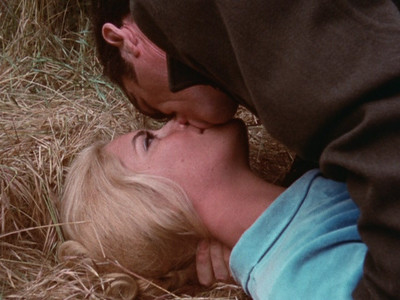
Equinox isn't very scary, nor is it even all that exciting. The closest we get to a real fright are the close-ups of Asmodeus attempting some malformed version of a French kiss when he tries to force himself on David's date for the day, the hot blonde Susan (Barbara Hewitt). Woods, being either an egomaniac or a genius, seemed to know this shot was gold, because he keeps going back to it, the horrifying memory of her near defilement haunting Susan. Given the breakneck pace of the movie (it's practically in real time), no other romantic subplot develops, so don't expect exploitative sexiness either. The closest we get is Dave pulling a crucifix out the front of Susan's pants. I guess she doesn't have any pockets…so to speak.

From a script standpoint, you pretty much get what you might expect from an amateur movie with a bunch of kids running around in the forest talking about a milquetoast devil and screaming. If that's your idea of fun, then you will probably dig Equinox. Its backyard vibe has a certain infectious charm. There are no hidden layers to it, however, no deep message, nothing to offset the fact that it's not too frightening or, really, very good at all. I mean, when your best actor is Frank Bonner, he who would be Herb Tarlek of WKRP, I guess you take what you can get.
Still, even more than 40 years later, it's plain to see Duren's skill at stop motion, and his enthusiasm lights up the screen whenever the effects shots take over. His creatures, especially the big simian known as Taurus, have cool designs, and the ambition of putting these clay creations in with real humans is pretty impressive. The lack of sophistication just reminds you that some guy made this, he carved it and made it move with his own two hands, and he did it back when hardly anyone else could. Equinox survives by and large because of that, because it's a quality you just can't get in the digital age. Even when people go old school, it's a gimmick, a conceit, no matter how genuine; it can never be the same kind of genuine.
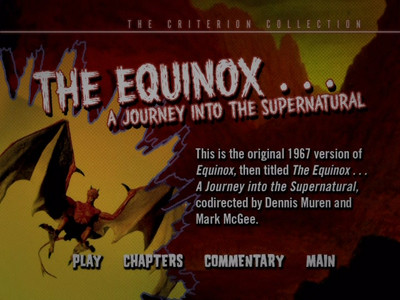
Included here, and serving as an even bigger testimony to Duren and McGee's DIY ethos, is the original The Equinox…A Journey Into the Supernatural. Shot on a cheap camera and with a skeleton crew, the difference between the productions is immediately obvious. The 16 mm Bolex camera they used only allowed for 30 second shots, and so there is a faster pace to it, even as the amateur acting slows the movie down. (It's interesting how much younger the cast looks despite not that much time really having passed). In a way, it adds to the verite feeling of the production (the disc's liner notes make a point out of quoting New Wave directors in relation to their praise of amateurs). There is a natural, unmannered look to the cinematography that I think actually helps the action scenes to be a little scarier. The short shots don't allow for any lingering. Likewise, despite the more labored set-up--the explanation that gets Susan along on the trip is totally unnecessary--we get our first glimpse of the Lovecraftian monster destroying Waterman's house before we even reach the 20-minute mark.
Aw, who am I kidding. The Equinox…A Journey Into the Supernatural is pretty much unwatchable. Every time a conversation comes along, the movie stops dead. Without the Asmodeus character, there is also a lot less drive to the plot, less of a presence of an immediate threat; the expedition into the woods is more meandering, more random. Despite his own hammy performance, at least Jack Woods also had a better sense of how to work with his actors. If you're watching this DVD for the effects, you might as well stick to Woods' redo, as the picture is better preserved and the image more clear.

I realize that in these kind of situations, it can be rather dreary to have an old fart like me hanging about complaining about the quality of the production. Kind of like were someone to unearth new high school-era skiffle recordings of the Beatles and I spent more time complaining about the audio quality and their inability to play rather than fully appreciating that I am listening to/looking at where so many things started. The spirit of how Equinox came together is probably best exemplified by the eight-minute short included on disc 2 here, Zorgon: The H-Bomb Beast from Hell. A lot of the same folks who worked on the main feature reteamed in 1972 for this goofy little movie, covering a lot of the same territory, proving that monster movies are in their blood--and apparently that they'd been watching a lot of Scooby-Doo. The closing shots of all the folks who took part, standing together and mugging for the camera, shows off the kind of heart that goes into these sorts of things.
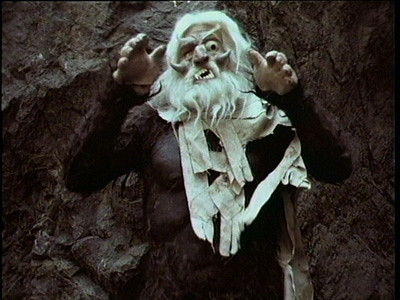
Also buried on disc 2 is the real surprise of this set: The Magic Treasure, a 20-minute solo film by effects animator David Allen. This claymation short is a lovingly realized fairy tale about a giant, an evil magician, and a much coveted treasure chest that is said to hold the secret of humanity's true specialness. Allen has created an entire storybook world, and though the message is simple, it still has meaning. This is a child's fable, after all, without the pretensions of adulthood, without the need for long explanations that go on for pages.
The Magic Treasure is interesting in comparison to Equinox, as both involve secrets that can change man's life and the giants who protect them. It's just a topsy-turvy version, where here the secret is positive and the giant is good. The scenes where the giant confronts the evil magician who steals the box--a kind of Asmodeus, if you will, and just in like the bigger movie, his actions suggest that man brings ill upon himself when he only desires selfish gain--are not dissimilar to some of the scenes we've seen in Equinox. Compare the still below to the one above where Skip Shimer is being chased by the shade.

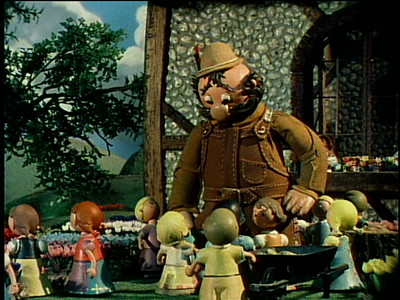

No comments:
Post a Comment